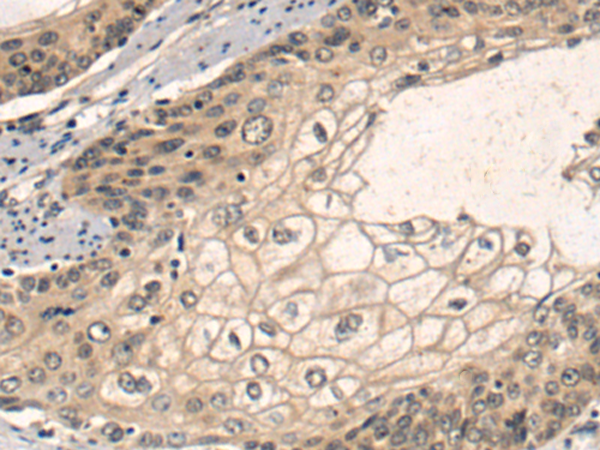

| WB | 咨询技术 | Human,Mouse,Rat |
| IF | 咨询技术 | Human,Mouse,Rat |
| IHC | 1/50-1/100 | Human,Mouse,Rat |
| ICC | 技术咨询 | Human,Mouse,Rat |
| FCM | 咨询技术 | Human,Mouse,Rat |
| Elisa | 1/5000-1/10000 | Human,Mouse,Rat |
| Aliases | SCD1; FADS5; SCDOS; hSCD1; MSTP008 |
| WB Predicted band size | 42 kDa |
| Host/Isotype | Rabbit IgG |
| Antibody Type | Primary antibody |
| Storage | Store at 4°C short term. Aliquot and store at -20°C long term. Avoid freeze/thaw cycles. |
| Species Reactivity | Human |
| Immunogen | Synthetic peptide of human SCD |
| Formulation | Purified antibody in PBS with 0.05% sodium azide and 50% glycerol. |
+ +
以下是关于SCD(硬脂酰辅酶A去饱和酶)抗体的3篇代表性文献的简要信息,涵盖其在代谢和癌症领域的研究:
---
1. **文献名称**:*Loss of stearoyl-CoA desaturase-1 function protects mice against adiposity*
**作者**:Ntambi, J.M., et al.
**摘要**:
本研究通过基因敲除小鼠模型揭示了SCD1在脂质代谢中的关键作用。作者利用SCD1特异性抗体检测蛋白表达,发现SCD1缺失的小鼠在高热量饮食下仍能抵抗肥胖和胰岛素抵抗,表明抑制SCD1可能成为代谢疾病治疗的靶点。
---
2. **文献名称**:*Stearoyl-CoA desaturase 1 is required for cancer cell survival in nutrient-deprived conditions*
**作者**:Kamphorst, J.J., et al.
**摘要**:
该研究通过免疫印迹(使用SCD1抗体)和代谢组学分析,证明癌细胞在营养缺乏的微环境中依赖SCD1介导的单不饱和脂肪酸合成来维持存活。抑制SCD1可显著抑制肿瘤生长,提示其作为癌症治疗靶点的潜力。
---
3. **文献名称**:*SCD1 inhibition synergizes with chemotherapy in hepatocellular carcinoma through ER stress pathways*
**作者**:Li, Z., et al.
**摘要**:
研究团队利用SCD1抗体评估肝癌组织中SCD1的表达水平,发现其与患者预后负相关。实验表明,SCD1抑制剂联合化疗药物可通过增强内质网应激(ER stress)显著抑制肿瘤进展,为肝癌治疗提供新策略。
---
**备注**:SCD抗体主要用于检测酶的表达水平(如Western Blot、免疫组化),上述研究体现了其在代谢调控和肿瘤机制探索中的工具价值。如需具体实验细节或更多文献,建议通过PubMed/Google Scholar检索关键词“SCD1 antibody”或“stearoyl-CoA desaturase research”。
×